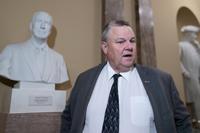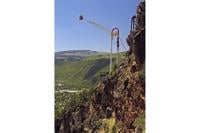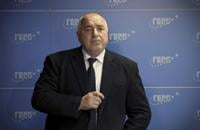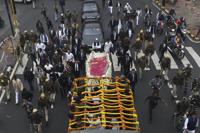WASHINGTON (AP) — As Democrat Jon Tester headed for a surprise victory in his 2006 U.S. Senate race, he attacked his incumbent Montana Republican rival's close ties to lobbyists and committed himself to a rigorous ethics standard.
Now as he looks to in a race that could decide control of the Senate, Tester is embracing a practice he once held against his opponent: taking contributions from lobbyists and executives of corporations while helping craft a government spending package that directs billions of dollars.
After Tester became chair of the Senate Defense Appropriations subcommittee in 2021, he received campaign contributions totaling over $160,000 from employees and committees representing the defense industry. At one point last year, 49 Lockheed Martin executives and lobbyists — none of whom had given to the senator in the past — gave Tester's campaign a combined total of nearly $50,000.
There is no indication the contributions swayed Tester’s decision making or that he committed any wrongdoing. But the donations came at a crucial juncture for both the defense budget and Lockheed Martin.
Senators at the time were crafting an $858 billion military package, and the Defense Department had submitted a late request for $1.4 billion for its after the cost for Lockheed to make the aircraft had overrun what was budgeted due to inflation and the pandemic. Without the extra funding, the previously approved planes were at risk of being canceled. The aircraft manufacturer was also looking to close out a multi-year deal with the Defense Department for the next round of its premier fighter jet.
Tester’s subcommittee successfully pushed to add $1.8 billion “for the restoration of all 19 at-risk aircraft,” according to an explanatory statement from the Senate Appropriations Committee.
Tester’s office declined interview requests with the senator for this story. Spokeswoman Sarah Feldman said in a statement, “Every decision he makes is based on one thing: what’s in the best interest of Montana and our national security, and he’ll never back down from defending the Montana way of life or defending this country from enemies that want to do us harm.”
Tester’s fundraising haul from federal contractors after he became chair of the Defense Appropriations Subcommittee is just a recent example of the way money flows to senior figures in Washington.
Most all lawmakers, Republicans and Democrats alike, accept campaign donations from lobbyists and corporations. Two other lawmakers who hold key roles on committees that determine military spending — Republican Sen. Roger Wicker of Mississippi and Democrat Rep. Rosa DeLauro of Connecticut — each took in more than $60,000 in campaign contributions from Lockheed employees last year.
In recent campaign cycles, Democrats have faced calls to reject . But Tester is also under reelection pressure as he faces a , where his small-town farming roots and populist reputation have helped him survive the state's increasingly conservative tilt.
Republicans tried to defeat Tester in 2018, attacking him for accepting money linked to corporations, but he still defeated the GOP nominee, Matt Rosendale, by four percentage points.
Rosendale is considered to be eyeing another run, as is Montana Republican Rep. Ryan Zinke, the former Interior secretary. Top Senate Republicans have also tried to recruit Tim Sheehy, a military veteran and CEO of a Montana-based provider of aerial firefighting and wildfire surveillance services, who could self-finance a campaign.
Tester has proven politically resilient, now as the only Democrat to hold statewide office in Montana.
Calling himself a “seven-fingered dirt farmer” after losing three fingers in a meat grinder as a child, Tester still returns home to work a farm in Big Sandy, Montana, that his family has held for three generations. When he is in Washington, he ambles the Capitol halls with a signature flattop haircut, seasons his statements to reporters with curse words and files bills aimed at “cleaning up” the lobbying industry as part of a mission to “reduce the power of big-moneyed interests in politics.”
He was among a group of Democrats who swept their party to the Senate majority in 2006, knocking off incumbent Republican Sen. Conrad Burns.
Tester in that race positioned himself as a fighter for the middle class who could take on a government that had become “an auction where the folks who get representation isn’t based on what’s right but who can write the biggest campaign check.”
Burns was linked through campaign contributions to lobbyist Jack Abramoff, who was convicted of conspiracy and fraud charges, and also faced scrutiny for working closely with lobbyists to craft spending packages.
In a 2006 debate, Tester accused Burns of casting “votes based on money that’s passed to you.”
“That is wrong, and it shows the fact that Sen. Burns has lost touch with Montana,” Tester said, adding: “Washington has changed him, it will not change me.”
After defeating Burns, Tester committed to having a judge conduct regular audits of his office’s relationships with interest groups. Feldman, Tester’s spokeswoman, said the audits have found no cause for concern, though a review for 2021 through 2022 has not yet been completed. Over the years, his office has intermittently released the reviews to the public.
Tester also abides by a commitment to post a public schedule of all the official meetings he takes, and in 2018 successfully proposed a requirement for senators to electronically file quarterly financial reports.
Feldman said those actions and others show he “holds himself to the highest standard of honesty, integrity and personal responsibility, going above and beyond his colleagues in Congress to crack down on lobbyist influence and increase accountability and transparency.”
The senator's campaign touts his fundraising, which totaled $8 million since 2021, as a “grassroots effort” powered by Montanans. Tester has also received over $1 million from industry groups, including those representing the financial industry, pharmaceutical corporations, defense contractors and boutique lobbying firms.
Business interests have shown up on Tester's list of campaign donors before. When he joined a bipartisan group of senators in , he held meetings with executives from Bank of America, Citigroup, Discover and Wells Fargo, as well as dozens of Montana banks. That year, he received $302,770 from the banking industry.
Tester's office said he has repeatedly pushed legislation that industry opposes, including by regulating pharmaceutical pricing, supporting enhanced safety regulations on railroads and working to increase competition among meatpackers.
Saurav Ghosh, who directs the Campaign Legal Center’s advocacy for campaign finance reform, said there's nothing surprising about defense contractors donating to Tester's campaign after he received a senior role crafting military spending.
“In some ways getting your voice heard in Washington often involves money,” Ghosh said, adding that corporate campaign committees and employees are within their rights to support candidates seen as friendly to their interests.
But he added: “When you take money from an industry that you’re responsible for regulating, that sends a message to the public that really calls into question whether you’re making policy decisions that are in the public’s best interest.”
The series of contributions to Tester from Lockheed employees came in November and December as Congress was crafting its broad military spending package. Among the programs at stake in the massive bill were 19 F-35 fighter jets that could have been cut from a Department of Defense contract with Lockheed Martin because the plane's production costs had increased. The Pentagon in November requested that Congress provide $1.4 billion in the military's budget to make up the funding shortfall.
Tester's subcommittee included $1.8 billion to cover the higher production costs “once all relevant factors are considered," though it also called for more congressional oversight of the F-35 program.
In a statement at the time, Tester praised the funding package for boosting pay, training and equipment for soldiers, as well as “shifting resources toward cutting-edge programs that’ll maintain our fighting edge over adversaries like China and Russia.” He also said the bill would bring $182 million to Montana universities and businesses with Defense Department contracts.
Tester has long pushed for robust military spending as well as medical care for veterans as a way to deliver for his home state, where the Malmstrom Air Force Base in Great Falls oversees the Minuteman missile program.
The expensive F-35 weapon system is seen by many lawmakers, including Tester, as crucial to keeping a fighting edge over potential adversaries. But the program has also faced criticism from some in Congress after repeated delays in its development.
Earlier this year, the military suggested, in an “unfunded priority list” — representing spending above the Defense Department's proposed budget — adding still another 19 F-35 aircraft to the 61 it planned to purchase. At one point, Tester proposed adding six of those 19 jets to the budget, but Feldman, his spokeswoman, noted that by the end of the year, none of those additional jets made it into the final spending package.
Still, the spending package directed billions to defense contractors, Lockheed Martin among them. The corporation was looking to close a $30 billion, multi-year contract with the Defense Department for 398 F-35 aircraft. Congress also included funding for 16 of Lockheed's C-130J Super Hercules aircraft in the legislation.
Lockheed Martin CEO James Taiclet, who gave $1,000 to Tester's campaign in November, told investors in a year-end call that passage of the budget package was “positive for the future."








































